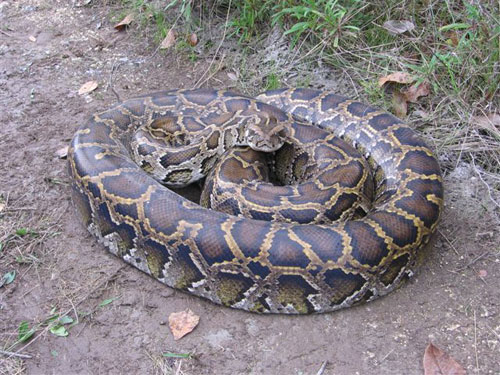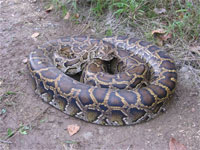IUCN adds 348 species of snakes to its Red List.
The United States Fish and Wildlife Service announced its support for what is the first significant conservation assessment of Asian snakes. The assessment, released June 19, 2012 by the International Union for Conservation of Nature (IUCN) adds 348 snake species native to China and other countries in Southeast Asia to the IUCN Red List. According to a press release put out by USFWS, snakes in Asia are harvested for the skin and food trade, as well as the traditional medicine trade, and these species constitute one of the largest under-regulated sectors of the wildlife trade worldwide.

The Burmese python, an invasive species in Florida, is listed by IUCN as vulnerable in its native range.
According to the USFWS, 103 of the 348 species of snakes recently on the list are categorized as data deficient, meaning there is not enough research on these species to determine the overall health of the populations of these animals. This information would help to determine the conservation status of these species. The USFWS cites reports that some species are declining in China because of habitat destruction as well as harvesting for trade, but any potential threats to wild populations of snakes as well as the potential ramifications of trading in these animals are still not yet fully understood. The King cobra (Ophiophagus hannah) and the Burmese python, (Python bivittatus) the latter of which is an invasive species in Florida, are both listed as vulnerable in their native range due to habitat loss, over-exploitation for medicinal purposes and harvesting as a food and skin source.
At the 15th Meeting of the Conference of the Parties (CoP15) to the Convention on International Trade in Endangered Species of Wild Fauna and Flora (CITES) in March 2010, the United States and China proposed a technical workshop to detail any future conservation efforts, management, and enforcement issues pertinent to the snake trade in Asia. The proposal drew international attention and was adopted at CoP15. The USFWS funded that workshop, hosted by China in April 2011. The conservation and management recommendations of that workshop are being reviewed and will be detailed at the 2013 CoP16 in Cancun, Mexico.



